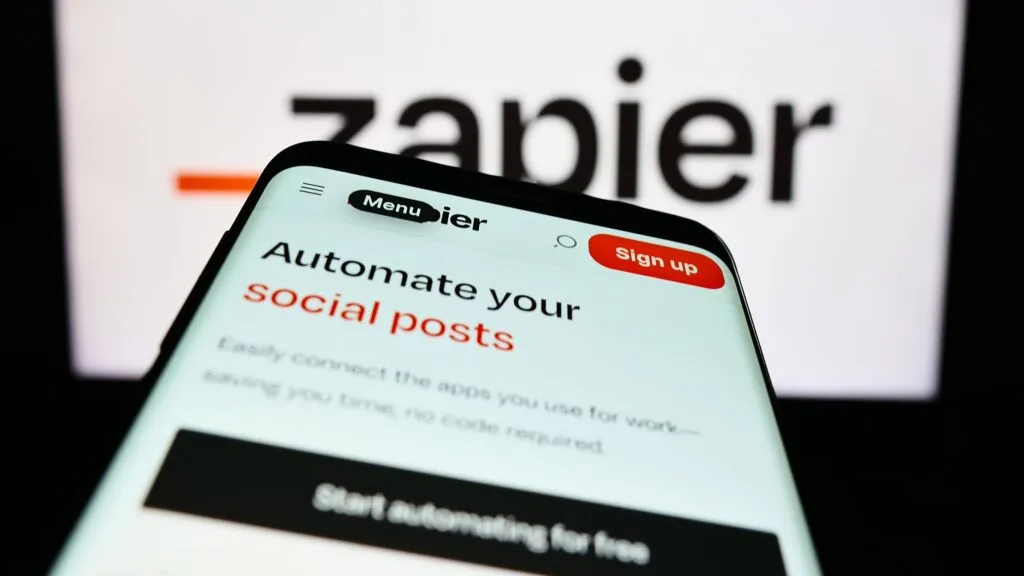Managing a website involves utilizing multiple tools—email marketing platforms, form submissions, CRMs, analytics, and e-commerce solutions. But what if you could make these tools work together seamlessly without manual effort? That’s where Zapier comes in.
Zapier is a no-code automation tool that connects different apps and automates workflows, making your website more efficient and responsive. Whether you’re handling leads, sending notifications, or syncing data, Zapier can do the heavy lifting for you.
What is Zapier and How Does It Work?
Zapier is an automation platform that connects over 6,000+ apps, allowing them to work together without coding. It operates on a system of Zaps, which are automated workflows triggered by specific actions.
For example, if someone fills out a contact form on your website, Zapier can:
- Add the lead to your CRM
- Send a follow-up email
- Notify your team on Slack
- Create a task in your project management tool
These automations eliminate manual work, reducing errors and ensuring a smoother user experience.
Why Automate Website Workflows with Zapier?
Your website is the center of your business operations, and manual processes slow things down. Here’s how Zapier helps:
1. Saves Time by Automating Repetitive Tasks
Instead of manually copying data between platforms, Zapier handles it instantly. This frees up time to focus on more important aspects of your business.
2. Reduces Human Error
Manual data entry increases the risk of mistakes. With Zapier, information is transferred automatically, ensuring accuracy.
3. Improves Response Times
Automation allows instant follow-ups when users take action on your site—like signing up for a newsletter, submitting a form, or making a purchase.
4. Connects Apps Without Coding
Not a developer? No problem! Zapier lets you integrate different tools without any technical skills.
Best Zapier Integrations for Websites
Zapier supports thousands of integrations, but some are particularly useful for automating website workflows.
1. Contact Form to CRM
Use Case: When a visitor submits a form, Zapier automatically adds the details to your CRM (like HubSpot, Salesforce, or Pipedrive).
Example Zap: Contact Form ➝ CRM ➝ Email Follow-Up
2. E-Commerce Order Notifications
Use Case: Automatically send order confirmations and track inventory by linking your e-commerce site with email, Google Sheets, and Slack.
Example Zap: New Shopify Order ➝ Slack Alert ➝ Google Sheets Entry
3. Blog Post Social Sharing
Use Case: Automatically share new blog posts on Facebook, Twitter, and LinkedIn to drive traffic.
Example Zap: New WordPress Post ➝ Social Media Auto-Post

4. Email List Growth
Use Case: Add new subscribers from your website forms to your email marketing tool (like Mailchimp or ActiveCampaign).
Example Zap: New Form Submission ➝ Email List ➝ Welcome Email
5. Calendar Booking Automation
Use Case: When a client books a call on your website, Zapier can create a Google Calendar event and send reminders.
Example Zap: Booking Confirmation ➝ Google Calendar ➝ Reminder Email
How to Set Up a Zap for Your Website
Want to create your first automation? Follow these 5 simple steps:
Step 1: Choose Your Trigger
A trigger is the action that starts the Zap. Example: “New form submission on my website.”
Step 2: Select the App to Connect
Choose the app that will receive the data (e.g., HubSpot, Mailchimp, Slack).
Step 3: Define the Action
Decide what you want the second app to do. Example: “Create a new contact in my CRM.”
Step 4: Test the Zap
Run a test to ensure the data flows correctly between apps.
Step 5: Activate & Monitor
Turn the Zap on and let automation take over. You can monitor activity in the Zapier dashboard.
Tips to Get the Most Out of Zapier
- Start Simple: Begin with basic automations before setting up complex workflows.
- Use Multi-Step Zaps: Automate multiple actions from a single trigger (e.g., form submission ➝ CRM ➝ Slack notification ➝ email).
- Filter Triggers: Set conditions to ensure automations run only when needed.
- Monitor Your Zaps: Check your dashboard to ensure everything is running smoothly.
- Upgrade When Needed: Free plans work for simple tasks, but paid plans offer advanced features.
Zapier is a game-changer when it comes to website automation. By connecting your apps and automating workflows, you save time, reduce errors, and improve user experience.
Whether you’re managing leads, running an e-commerce store, or publishing content, Zapier helps you work smarter—not harder.





